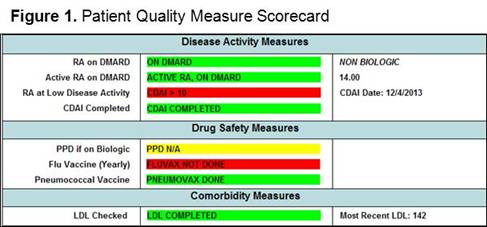Session Information
Session Type: Abstract Submissions (ACR)
Background/Purpose: Rheumatoid arthritis (RA) is a common chronic disease with significant morbidity, mortality, and cost. To optimize care for RA patients, we developed a novel value-based population care model – AIM FARTHER (Attribution, Integration, Measurement, Finances, And Reporting of THERapies). AIM FARTHER was designed to improve quality and reduce cost of RA care.
Methods: The AIM FARTHER model was designed and implemented for all RA patients cared for by the 17 rheumatologists within our health system (n=~2,300 patients). Components included 1) registry development; 2) defining roles and attribution; 3) integration of primary and specialty care; 4) strategic approach to RA care; 5) RA quality measure bundle development; 6) task management and performance reporting; and 7) a new financial/incentive model. The RA quality bundle included 8 measures – RA on DMARD (Disease Modifying Anti-Rheumatic Drug), Active RA on DMARD, RA with CDAI (Clinical Disease Activity Index), RA at low disease activity, TB testing if on biologic, Influenza vaccination, Pneumococcal vaccination, and LDL (low density lipoprotein) checked. These measures were collected electronically, providing the analytics for a patient scorecard (Figure 1). The scorecard was used to close care gaps, rolled up into provider and department performance reports, and shared transparently. Analysis of AIM FARTHER included quality (individual measures and “all or none” bundle score) and cost (biologic de-escalation savings).
Results: AIM FARTHER was implemented August 2012 (2,150 RA patients) with 22 month follow-up (2,378 RA patients). Significant improvement was noted in all quality measures except active RA on DMARD (92% to 93%)(Figure 2). Final values were RA on DMARD 90%, RA with CDAI 84%, RA at low disease activity 53%, TB testing on biologic 93%, Influenza vaccine 75%, Pneumococcal vaccine 72%, and LDL checked 95%. The all or none bundle improved from 22% to 40% (40% of the 2,378 RA patients had achieved 100% of their applicable quality measures). Cost savings from biologic de-escalation were $720,000 for 2013 with projected savings estimate of $1.2 million for 2014.
Conclusion: AIM FARTHER is a novel care model employing provider engagement, process redesign, measurement, and information technology to provide optimal care for patients with RA. AIM FARTHER showed significant improvement in quality measures and reduction in cost of care for a population of over 2,300 RA patients. Additionally, it supports the pivotal role that rheumatology can play in the systematic care of patients with RA.
Disclosure:
E. D. Newman,
None;
W. T. Ayoub,
None;
D. M. Pugliese,
None;
C. Cedeno,
None;
J. Brown,
None;
T. M. Harrington,
None;
T. P. Olenginski,
None;
A. Bili,
None;
A. E. Denio,
None;
L. L. Schroeder,
None;
D. Torretti,
None;
T. Sharma,
None;
L. Kirillova,
None;
S. Mathew,
None;
J. Cote,
None;
B. Oppermann,
None;
C. Sullivan,
None;
S. Bishwal,
None;
B. DelVecchio,
None;
H. Aylward,
None.
« Back to 2014 ACR/ARHP Annual Meeting
ACR Meeting Abstracts - https://acrabstracts.org/abstract/a-novel-population-care-model-in-rheumatoid-arthritis-significant-improvement-in-quality-and-reduction-in-cost-of-care/


